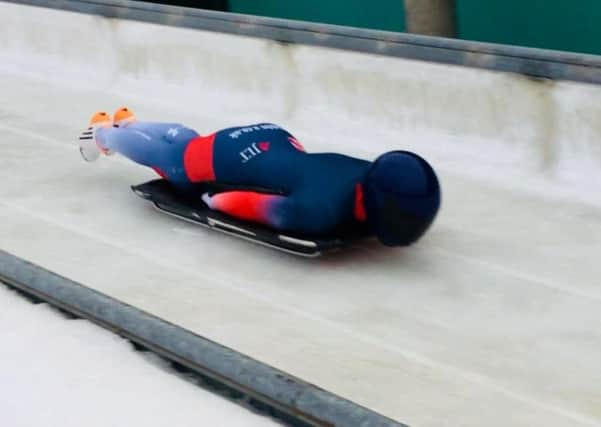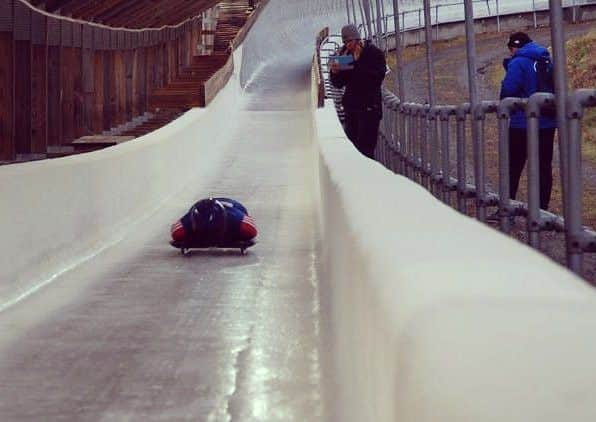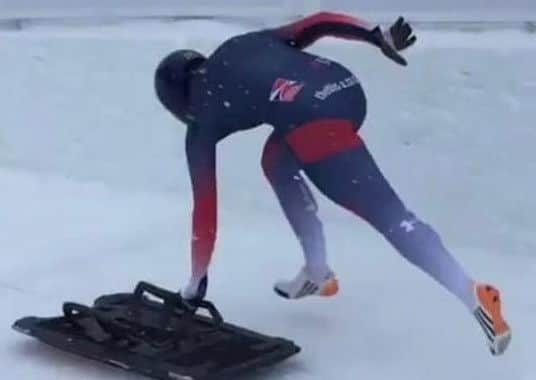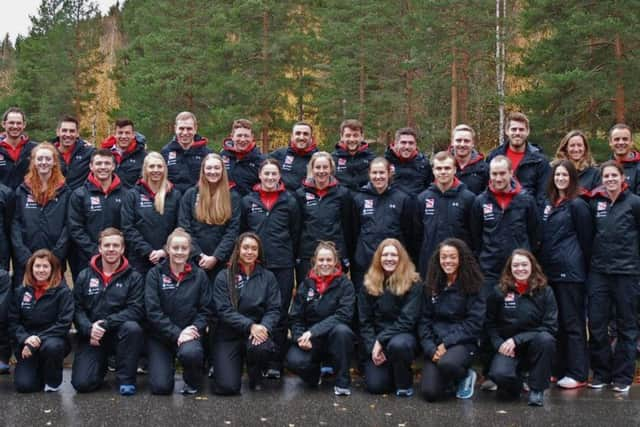Hitting the wall at 80mph – Melton athlete Amelia Coltman’s life as a GB skeleton racer


This is perhaps stating the obvious for someone involved in a sport where zipping down a track headfirst at a faster speed than is legally allowed on a motorway comes as standard.
Yet in contrast to the electrifying speeds that your typical skeleton racer is aiming to hit, in career terms elite sliders need patience. And plenty of it.
Advertisement
Hide AdAdvertisement
Hide AdIronically for one of sport’s most rapid challenges, there is no fast track to success, with sliders allowed nowhere near ice for the first year, while the programme aims to deliver an elite competitor in eight or nine years.


Coltman (22) joined the British Skeleton Talent Squad back in the summer of 2017, one of just nine to be handpicked for the programme after a series of increasingly demanding trials and tests had gradually whittled down the initial 3,500 entries.
“It’s pretty much two years of training and you have to keep sight of the end goal,” she said.
“My first year was about getting to grips with the sport, meeting the demands of training and trying to get into the routine of amateur life.
Advertisement
Hide AdAdvertisement
Hide Ad“Skeleton is not easy and can be very painful. Hitting the concrete wall at 70 to 80mph hurts, so it’s making sure you can deal with that day in and day out.


“But this year has been a bit more performance-focussed.”
The reason for the delayed introduction to the slippery stuff is down to the potential high risks of the winter sport.
Techniques must first be honed and mastered to keep risk to a minimum, while fitness and strength must be built to meet the skeleton’s particular demands on the body.
And when you’re finally allowed to practice on track, then comes a further wait for the first taste of competition.
Advertisement
Hide AdAdvertisement
Hide Ad

But despite the lack of opportunity for novice sliders to measure themselves against others, there are regular targets to meet.
These test not only aptitude, but equally importantly, the mentality and character of Olympic wannabees.
“It’s because the programme is so competitive and there are so many good athletes,” she explained.
“You have to make sure you’re at your best at all times.
“I quite enjoy that. I enjoy trying to chase after targets rather than being scared of them.
Advertisement
Hide AdAdvertisement
Hide Ad“I have always liked pressure; it brings the best out of me.”
This mental fortitude will be pushed to even greater limits if the Melton athlete reaches her eventual end goal of an Olympic podium.
Skeleton has been comfortably Britain’s most bankable asset when it comes to Winter Olympic medals.
After Amy Williams won gold in the discipline in 2010, Lizzie Yarnold raised the sport’s profile still further when she retained her Olympic title last year, while team-mate Laura Deas took the bronze.
Advertisement
Hide AdAdvertisement
Hide AdTo be training in their slipstream is one of British sport’s golden tickets, but with it comes big demands.
“I would like to get to the 2022 Winter Olympics, but my main goal is 2026 and to win a medal there,” Coltman added.
“But next year they will bring more athletes in and they will put pressure on you.
“There is no time for slacking off, otherwise you’re out the door.”
Advertisement
Hide AdAdvertisement
Hide AdPeak targets are part and parcel of the programme and come at the top end of demanding, with a zero tolerance policy for failure.
“In the summer we were given targets to hit on the push track, and if we couldn’t meet that we wouldn’t get on to the next stage,” she said.
“You’re basically out of the programme.
“I lost a lot of sleep around that one.”
The sleepless hours were triggered when a long-standing shin complaint came to a head, putting her on crutches for eight weeks while the deadline loomed.
“I always had shin problems during my tennis and running days and it crept in during my sprint training here.
Advertisement
Hide AdAdvertisement
Hide Ad“We couldn’t stop it from hurting so had to go extreme measures and stop working.
“I wasn’t allowed to put my foot down for a couple of weeks so it was hard to keep motivated.
“We had the whole summer to hit the target, but because I wasn’t able to run for seven to weight weeks, it put me back more towards the end of summer and you start thinking ‘am I going to make it’.”
The injury may have been a blessing, albeit one wearing a heavy disguise.
Advertisement
Hide AdAdvertisement
Hide AdWhen she did eventually beat the target, comfortably, she not only demonstrated her athletic ability, the injury had given Coltman the chance to highlight her resolve and mental toughness.
Sending her into winter with an added spring in her step, Coltman again exceeded her next target, going within 0.2secs of the world’s best push times, in skeleton terms a country mile better than the 0.3-second target.
“I wasn’t expected to hit that benchmark until next year so that gave me a big confidence boost.”
Finally, after almost two years of tuition, coaching, learning, and training, it was time for her international debut in St Moritz in February.
Advertisement
Hide AdAdvertisement
Hide AdHeavy snow in the famous resort reduced the first race to one run and, unusually, organisers made it a mixed race.
“I had to go against the male sliders which was a bit annoying, but I managed to come seventh out of 28 and first female,” she said.
“I didn’t really have any expectations, I just wanted to get used to racing.”
After two runs in the next race she finished her first taste of racing in an encouraging eighth overall.
Advertisement
Hide AdAdvertisement
Hide Ad“I really enjoyed it,” she added. “I beat some of our British boys, and in the first race I beat the girls who are ahead of me in the programme.
“The coaches were really happy with it. Now I’m looking to aim quite high and overtake more people.”
With the racing season over, the programme has gradually been winding down towards a much-needed holiday in April and some time back at home in Melton with parents Gary and Theresa.
But when you’re chasing Olympic gold, don’t expect much down time.
Advertisement
Hide AdAdvertisement
Hide AdThe exhausting cycle begins again in May and after a summer of five to six days a week training in Bath, Coltman will then embark on her first full racing season on the European circuit next winter.
“It is such a good programme,” she said. “We have a world leading support team, the world’s best coaches and the team aspect is really good.
“You get to train with Laura Deas and people who went to the (Olympic) Games.
“I always find it inspiring to look up to them, but also to chase what they have done.”